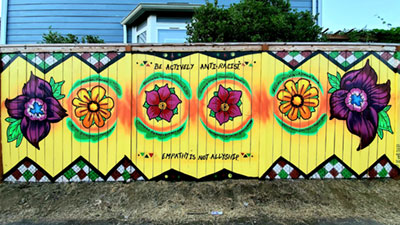By Karen Wells | CNA Media Team
While on a neighborhood bike ride, I noticed a brightlycolored mural at the corner of 15th Avenue at Sumner Street. Bold flowers bloomed on a sun-bright yellow background.

A caption, “Empathy is not Allyship” runs along the border. Names of slain African Americans encircle three of the six vibrant blossoms.
The artist – find him at Instagram. com/jamjamart – chose six blossoms as images of peace and hope. Imagine they represent the people: Asian, Black, Latinix, Native, white and the ancestors.
Witnessing the names, caption and visual intensity of the mural sparks the question regarding the current social justice movements: “Empathy is not enough?”
A child as young as 2 shows empathy toward another child who is crying. They try to soothe by offering a toy or hugging. This feeling of empathy pushes them into action to aid someone outside of their immediate world.
Feeling empathy can be a starting point for social justice engagement and change.
I followed up by contacting the muralist and spoke with several neighbors, including the homeowner who commissioned the mural. Several themes surfaced.
At the top of the list: adults are more complicated than 2 year olds. We want concrete reasons why we should feel empathy toward others, especially those who are outside our social circles.
Next, there is concern: is it OK to feel empathy? Then follows self-doubt as to how to proceed, and inaction.
This introspection can feel bothersome — easier to do nothing or simply become absorbed in feeling empathetic. Use empathy to embrace being an active ally.
Take a moment to suspend the notion that you know all there is to know about being an ally. Take a moment to breathe this in. Let it wash over you.
You can always start tomorrow, yet starting today supports neighbors who are trying to live their best lives today.
- Good news: it’s OK to start with small actions. Here are some to get you started:
- Check your privilege at the door, show up and listen
- Engage, speak up, stand up to demoralizing comments of others
- Volunteer your time, donate resources
- Get informed, examine different viewpoints, look for common ground, educate yourself on the needs
- Be authentic in your actions
Think about this quote from Angela Davis, PhD. “I am no longer accepting the things I cannot change. I am changing the things I cannot accept.”
Empathy is not enough? Thanks for asking.
Editor’s note: Karen has several resources to offer to further explore this theme. Check Facebook.com/groups/ ConcordiaPDX, where she’ll post them in mid-December.
CNA respects the views and beliefs of all cultures and faiths. The views expressed by this writer do not necessarily reflect the views of CNA.
Karen Wells is a retired early childhood communit y educator, health and safety trainer.